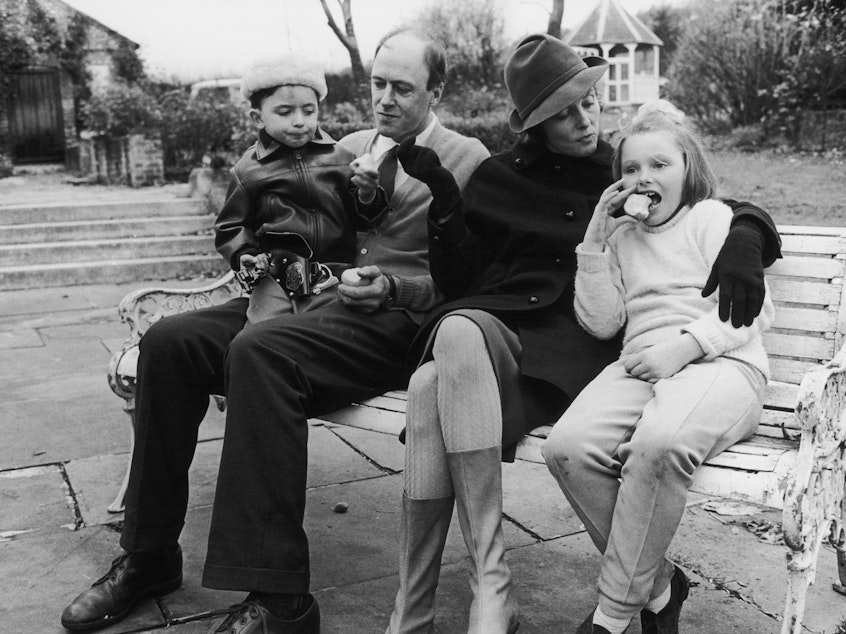Beyond Rash And Fever: How Measles Kills 100,000 Children A Year

In 1962, children's book author Roald Dahl lost his oldest daughter, Olivia, to measles. She was 7 years old.
Editor's note: This story was originally published in 2015 and has been updated.
Twenty-six years later, Dahl wrote a letter to parents about what happened:
"As the illness took its usual course I can remember reading to her often in bed and not feeling particularly alarmed about it. Then one morning, when she was well on the road to recovery, I was sitting on her bed showing her how to fashion little animals out of coloured pipe-cleaners, and when it came to her turn to make one herself, I noticed that her fingers and her mind were not working together and she couldn't do anything.
" 'Are you feeling all right?' I asked her.
Sponsored
" 'I feel all sleepy,' she said.
"In an hour, she was unconscious. In twelve hours she was dead."
Olivia had what's called measles encephalitis. The virus had spread to her brain. Her immune system rushed in to fight it. Her brain swelled up.
At the time, Dahl wrote, "a reliable measles vaccine had not been discovered."
Today there is a vaccine for this extremely contagious disease. But certain groups of parents opt not to vaccinate their children — and that has led to outbreaks in countries like Italy and Israel and recently in Washington state, where the governor has declared a state of emergency with 41 confirmed cases.
Sponsored
"A lot of folks feel measles isn't a big deal. It just causes a rash and a fever," says Dr. Alice Ackerman, professor emeritus at Virginia Tech Carilion School of Medicine. "In the majority of cases, that's true."
But in about 1 in 1,000 cases, the infection becomes systemic and moves to the brain.
"This causes behavioral changes, potential brain swelling and convulsions," Ackerman says. There's little doctors can do. Children can be left deaf, blind or with mental retardation — if they recover.
In some cases the brain infection can set in quickly, as with Dahl's daughter. But there's a small chance, Ackerman says, that 7 to 10 years after a child has the measles, subacute sclerosing panencephalitis, or SSPE, can occur.
"Through my four decades of practice I saw children admitted to my ICU with horrible brain occurrences where they might start having seizures, started drooling, lost their ability to interact," she says. "It's heartbreaking."
Sponsored
The only way to prevent these potential problems, she says, "is to prevent yourself from getting measles in the first case" with the vaccine.
SSPE is very rare: Only about 1 in 5,000 people with the measles will develop it, a study found. But other serious complications from measles aren't so rare.
The most common is pneumonia.
Measles typically infects the upper respiratory tract, like the flu or common cold does. But when measles moves to the lower respiratory, it becomes pneumonia — and much more problematic.
"Pneumonia impairs the body's ability to harness oxygen in the air," says Dr. Amesh Adalja, an infectious disease specialist at the Johns Hopkins Center for Health Security. "Children don't get enough oxygen in their lungs to supply the body. Some end up on a ventilator."
Sponsored
Up to 1 in 20 children worldwide who catch measles gets pneumonia, the Centers for Disease Control and Prevention says. It's one of the most common ways that measles killed 110,000 children worldwide in 2017, most of them under age 5.
And there's no way to predict which children will develop severe complications to measles, Adalja says. "For all [intents and] purposes, anyone can get pneumonia from the measles or encephalitis."
But people with weak immune systems are at higher risk, Adalja says. That includes those undergoing some cancer treatments, organ donor recipients, the elderly and babies.
Malnourished children in poor countries are also vulnerable to measles encephalitis and pneumonia, says Ackerman. "Their immune systems can't build an appropriate response against the virus."
In many instances, the parents of these children don't have access to vaccines or treatments for measles complications. These parents experience what Dahl and his family faced a half-century ago: losing a child to measles. [Copyright 2019 NPR]
